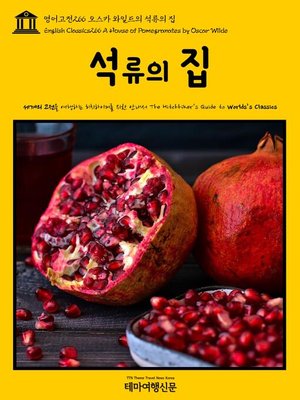영어고전266 오스카 와일드의 석류의 집(English Classics266 A House of Pomegranates by Oscar Wilde)
ebook ∣ 영어고전(English Classics)
By 오스카 와일드

Sign up to save your library
With an OverDrive account, you can save your favorite libraries for at-a-glance information about availability. Find out more about OverDrive accounts.
Find this title in Libby, the library reading app by OverDrive.



Search for a digital library with this title
Title found at these libraries:
| Library Name | Distance |
|---|---|
| Loading... |
오스카 와일드의 첫 번째 동화집 행복한 왕자(The Happy Prince and Other Tales)(1888)을 기억하십니까? 석류의 집(A House of Pomegranates by Oscar Wilde)(1891)은 오스카 와일드의 두 번째 동화집(a collection of fairy tales)으로 어린 왕(The Young King)부터 왕녀의 생일(The Birthday of the Infanta), 어부와 그의 영혼(The Fisherman and his Soul) 그리고 별의 아이(The Star-child)까지 총 네 편의 작품이 실려 있습니다. 네 편 모두 그리 길지 않은 단편으로 국내에도 번역본이 있습니다. 오스카 와일드의 첫 번째 동화집 행복한 왕자(The Happy Prince and Other Tales)(1888)를 인상깊게 읽은 독자분들에게 강추! 테마여행신문 TTN Korea 영어고전(English Classics)과 함께 어제도, 오늘도, 내일도 멋진 문학여행을! B어린 왕(The Young King) : 어린 왕(The Young King)은 왕가와 귀족들이 서민들을 얼마나 착취하는지 풍자하는 이야기입니다. 양치기의 아들로 자란 16살 소년은 급작스럽게 죽은 왕의 유일한 후손으로 왕위에 오르기 위해 궁전으로 불려옵니다. 대관식을 앞둔 소년은 세 번의 악몽을 연달아 꾸는데, 각각의 꿈은 소년이 입기 위해 만들어진 화려한 의상과 이를 장식하기 위한 진주와 루비를 마련하기 위해 농부와 노예, 그리고 노동자들이 어떤 고난과 역경을 통해 착취당하고 있는지를 생생하게 보여줍니다. 화려한 궁전과 더욱 화려한 왕의 의상이 만들어진 과정을 알게된 어린 왕은 과연 대관식에서 왕좌에 선뜻 앉을 수 있을까요?'In war,' answered the weaver, 'the strong make slaves of the weak, and in peace the rich make slaves of the poor. We must work to live, and they give us such mean wages that we die. We toil for them all day long, and they heap up gold in their coffers, and our children fade away before their time, and the faces of those we love become hard and evil. We tread out the grapes, and another drinks the wine. We sow the corn, and our own board is empty. We have chains, though no eye beholds them; and are slaves, though men call us free.' 왕녀의 생일(The Birthday of the Infanta) : 인판타(Infanta)는 스페인어로 왕녀(a daughter of a Spanish or Portuguese monarch)란 뜻으로 왕자는 인판테(infante)라 부릅니다. 스페인을 배경으로 한 두 번째 동화는 스페인 국왕의 딸 인판타(Infanta)와 춤을 추는 어느 이름 모를 꼽추의 이야기입니다. 숲에서 홀로 춤을 추던 꼽추는 그의 아버지가 궁전에 팔아버린 것도 모른 채, 왕녀의 생일 파티에서 열심히 춤을 춥니다. 자신을 보며 웃고 박수치는 관중들을 보며 꼽추 또한 흥겨웠으나, 우연하게 발견한 거울에서 자신의 끔찍한 모습을 보고 그 모든 것이 비웃음이자 조롱이였다는 것을 깨닫고야 맙니다!! 자신의 외모를 목도하게 된 그의 운명은 과연 어떻게 되었을까요? 외모와 차별이란 자극적인 소재를 충격적인 결말과 버무린 왕녀의 생일(The Birthday of the Infanta)은 대중들에게 생각할 꺼리를 던져주는 도발적인 작품으로 무언극 Der Geburtstag der Infantin(1908)을 비롯해 발레 Az infánsnő születésnapja(1913, 1916), 오페라 츠베르그(Der Zwerg)(1921), 뮤지컬 Poisoned Present for Princess(2011) 등으로 제작되었습니다. The Infanta! It was a monster, the most grotesque monster he had ever beheld. Not properly shaped, as all other people were, but hunchbacked, and crooked-limbed, with huge lolling head and mane of black hair. The little Dwarf frowned, and the monster frowned also. He laughed, and it laughed with him, and held its hands to its sides, just as he himself was doing. He made it a mocking bow, and it returned him a low reverence. He went towards it, and it came to meet him, copying each step that he made, and stopping when he stopped himself. He shouted with amusement, and ran forward, and reached out his hand, and the hand of the monster touched his, and it was as cold as ice. He grew afraid, and moved his hand across, and the monster's hand followed it quickly. He tried to press on, but something smooth and hard stopped him. The face of the monster was now close to his own, and seemed full of terror. He brushed his hair off his eyes. It imitated him. He struck at it, and it returned blow for blow. He loathed it, and it made hideous faces at him. He drew back, and it retreated. 어부와 그의 영혼(The Fisherman and his Soul) : 세 번째 동화는 인어와 사랑에 빠진 어부가 그녀와 결혼하기 위하여 자신의 영혼을 잘라낸 이야기입니다. 인간은 영혼을 가지고 있기에 인어와 함께 사랑에 빠질 수 없다는 설정이 독특하네요! 자신의 영혼을 떼어내는 것은 결코 만만치 않은 일이였습니다. 갖은 노력 끝에 어부는 마녀의 조언으로 그림자에 깃든 자신의 영혼을 베어낸 후 인어와 함께 바다 밑에서 생활하기 시작합니다. And one evening he called to her, and said: 'Little Mermaid, little Mermaid, I love thee. Take me for thy bridegroom, for I love thee.' But the Mermaid shook her head. 'Thou hast a human soul,' she answered. 'If only thou wouldst send away thy soul, then could I love thee.'흥미로운 것은 어부의 몸으로부터 벗어난 영혼은 자신의 의지를 가지고 세상을 방랑한다는 것!...







